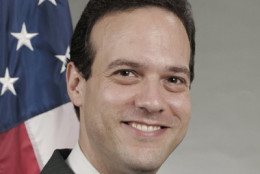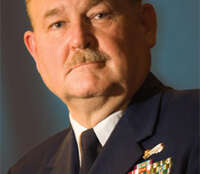Hubbard Radio Washington DC, LLC. All rights reserved. This website is not intended for users located within the European Economic Area.
On Air: Federal News Network
Defense Industry
-
Next week in Fort Lauderdale, Florida, hundreds of the military’s smartest minds will come together for the biggest annual gathering in the world of military medicine. In past years, the Military Health System Research Symposium has led to the expansion of revolutionary new practices in combat care – many of which have made their way into the civilian sector. Col.Todd Rasmussen directs the Army’s Combat Casualty Care Research Program, and Rear Adm. Bruce Doll directs research and development at the Defense Health Agency. They talked with Federal News Radio’s Jared Serbu about what they expect from next week’s conference.
August 14, 2015 -
The Defense Department’s program to let employees use smartphones on the secret network is becoming rather popular. After moving from the pilot to its full production stage in June, the Defense Mobile Classified Capability–Secret is in demand not just in the military, but across the government. Federal News Radio’s executive editor Jason Miller joined Tom Temin on the Federal Drive with details on why DoD’s program is so popular.
August 13, 2015 -
President Obama wants to build one of the fastest supercomputers ever in the next 15 years. The exascale computer would run about 30 times faster than today's fastest supercomputer. It's part of the National Strategic Computing Initiative in collaboration with the Energy Department, Pentagon, and National Science Foundation. Simon Szykman is the chief technology officer for Attain's federal services division and former chief information officer at the Commerce Department. He tells In Depth with Francis Rose that the project might not live up to all the hype.
August 04, 2015 -
The Defense Department's nuclear forces arsenal is getting a close look for affordability. Think tanks like the Government Accountability Office and even the Pentagon itself are all looking at how much money the agency should spend on nuclear stock. Todd Harrison is senior fellow for defense budget studies at the Center for Strategic and Budgetary Assessments. He tells In Depth with Francis Rose why he thinks it's important to look at nuclear forces in the context of the whole weapons inventory.
July 31, 2015 -
After nearly 20 years of development, the Marine Corps said its first squadron of F35B joint strike fighters is just about ready for combat. It's the first joint strike fighter model to reach initial operational capability and the Defense Department spends nearly $100 billion in the process so far. Jim Hasik is a senior fellow at the Brent Scowcroft Center on International Security at the Atlantic Council. He tells In Depth with Francis Rose what the Pentagon could have spent its money on instead.
July 29, 2015 -
The Army laboratory that sent dozens of batches of live Anthrax to research facilities by accident should have known for years that something was wrong with their protocols for handling biotoxins. The Department of Health and Human Services has identified at least four serious safety violations by Dugway Proving Ground over the last decade and issued several citations. More from Federal News Radio’s DoD reporter Jared Serbu.
July 28, 2015 -
The Defense Department wants to change some of its personnel policies for the first time in decades. Acting Undersecretary of Defense for Personnel and Readiness Brad Carson is working on series of recommendations as part of the Pentagon's Force of the Future initiative. Those recommendations are due to Defense Secretary Ash Carter by Aug. 19. Ron Sanders is the vice president of Booz Allen Hamilton and former chief human capital officer for the Office of the Director for National Intelligence. He tells In Depth with Francis Rose about a war gaming exercise he participated in and what the future of the defense workforce might look like.
July 23, 2015 -
The military lacks the resources it needs for nearly every one of its forces. The Marines are running with two-thirds of the number of battalions it has needed in the past to meet its daily operational needs. The Army is losing 40,000 active duty troops in the next two years. And advanced missile defense programs are underfunded and behind schedule. Michaela Dodge is a senior analyst for defense and strategic policy at the Heritage Foundation. She tells In Depth with Francis Rose that DoD and the next administration are in desperate need of a new nuclear game plan.
July 22, 2015 -
Lockheed Martin plans to sell its IT business and acquire helicopter-maker Sikorsky for $9 billion. It's a deal with far-reaching consequences — not just for Lockheed and Sikorsky parent United Technology, but also for the broader defense industrial base. Jesse Holler is a quantitative analyst at Bloomberg Government. He joined Tom Temin on the Federal Drive with more analysis on this deal.
July 22, 2015 -
With a nuclear deal kind of, sort of in place, Iran has been at the forefront of the news lately. But it would be a mistake to take the focus off other places on the radar screen. In particular, China. Peter Singer is a military expert and futurist at the New America Foundation. He joined Tom Temin on the Federal Drive to explain why he believes the Chinese threat is the primary one the United States faces.
July 17, 2015 -
Geographic information systems and intelligence have been converging for a while now. Now nearly all forms of information are available in digital form. The challenge is integrating them. That discipline is called GEO-INT. Former Coast Guard Commandant Thad Allen is now an executive vice president at Booz Allen Hamilton. As a long-time user of both geographic information and intelligence, he joined Tom Temin on the Federal Drive how this data convergence is changing the intelligence landscape and even his own company.
July 10, 2015 Sotera Defense Systems President and CEO Deb Alderson sat with the Women of Washington radio show to discuss her career in defense, both inside the government and as a contractor.
June 03, 2015-
The Air Force and Northrop Grumman have a new deal in place. They're calling it a public-private partnership, and it will enable Northrop Grumman to provide the Air Force with sustainment of future weapon systems. Air Force officials say they hope the deal will improve efficiency, both in negotiations and in implementing future projects. Dr. Chris Jones, the president of Northrop Grumman Technical Services, joined Tom Temin on the Federal Drive with more on the partnership and how it works.
April 01, 2015














